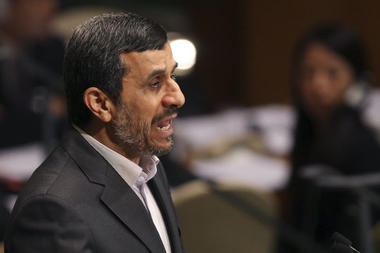Tuesday 25 September 2012 - 12:34
Story Code : 6187
Ahmadinejad's comments inflame Israeli ambassador
Iranian President Mahmoud Ahmadinejad called Israel a 'fake regime' shielded by the US at the UN General Assembly, prompting Israeli Ambassador,�Ron Prosor to walk out of the meeting.
Iran's president called�Israel�a nuclear-armed "fake regime" shielded by the�United States, prompting Israel's U.N. ambassador to walk out of a high-level�U.N.�meeting Monday promoting the rule of law.
Iranian President Mahmoud Ahmadinejad�also accused the U.S. and others of misusing freedom of speech and failing to speak out against the defamation of people's beliefs and "divine prophets," an apparent reference to the recently circulated amateur video made in the U.S. which attacks Islam and denigrates the�Prophet Muhammad.
The Iranian leader, who has called for Israel's destruction, used his speech to denounce Israel's occupation of Palestinian territory and U.S. vetoes in the�U.N. Security Council�to back its ally. He urged all nations to "hold occupiers accountable and make efforts to return the occupied territories to their rightful owners."
Ahmadinejad blamed the "discriminatory" veto power of the U.S.,�China,�Russia,�Britain�and�France�for the Security Council's failure to ensure peace in the world, and he called for a change in the rules "in favor of nations with due regard to justice."
As Ahmadinejad addressed leaders and ministers from more than 100 countries, Israel's U.N. Ambassador Ron Prosor walked out of the General Assembly hall.
"Ahmadinejad showed again that he not only threatens the future of the Jewish people, he seeks to erase our past," Prosor said in a statement.
"Three thousand years of Jewish history illustrate the clear danger of ignoring fanatics like Iran's President, especially as he inches closer to acquiring nuclear weapons," he said. "Those who ignore his hateful words today, will bear responsibility for his deeds tomorrow."
Israel views a nuclear-armed Iran as an existential threat, but Iran insists its nuclear program is purely peaceful and aimed solely at producing nuclear energy.�Israeli Prime Minister Benjamin Netanyahu�believes�Tehran�is moving closer to producing a nuclear weapon and has been pushing the United States to set "red lines" which, if crossed, might lead to�American militaryaction.�President Barack Obama�has refused to set any "red lines."
The U.S. delegation did not walk out of Monday's meeting, as it has in the past when Iran attacked Israel directly.
Ahmadinejad did not name either Israel or the U.S. in his speech but his targets were clear when he said: "We have witnessed that some members of the Security Council with veto right have chosen silence with regard to the nuclear warheads of a fake regime while at the same time they impede scientific progress of other nations."
Secretary-General Ban Ki-moon�organized the first-ever high-level U.N. meeting on the rule of law hoping to send a strong signal to people everywhere that world leaders "are serious about establishing well-functioning institutions and delivering justice."
He told delegates he is proud that the United Nations is promoting the rule of law in more than 150 countries.
Ban called on all states to apply the law equally, both nationally and internationally, and not allow political self-interest to undermine justice. He also called on world leaders "to uphold the highest standards of the rule of law in their decision-making at all times."
At the start of the day-long meeting, diplomats from more than 100 countries adopted a declaration reaffirming "that states shall abide by all their obligations under international law." It stresses the importance of the rule of law in preventing and resolving conflicts and building peace in countries emerging from war and urges the U.N. and the international community to support such efforts.
U.S. Attorney General Eric Holder�called the meeting "historic" and said the United States will continue "to support U.N.-led efforts to improve access to legal aid, to more effectively combat drug trafficking and organized crime" and to promote the rule of law in conflict and post-conflict situations.
He said the meeting underscored a key conclusion in a recent�World Bank�report "that in today's world, the greatest threat to development and recovery is a weak rule of law."
Many speakers cited the impact of corruption and stressed that no one can be above the law, from high government officials to ordinary citizens.
"In developing nations, corruption is the mortal enemy of democracy,"�Mongolia's President Tsakhia Elbegdorj said. "It is like an infectious disease � it must be attacked head on."
He said high-level corruption also hurts development, so the fight for the rule of law "is also a fight for more transparent and successful economic development."
The Iran Project is not responsible for the content of quoted articles.
# Tags











